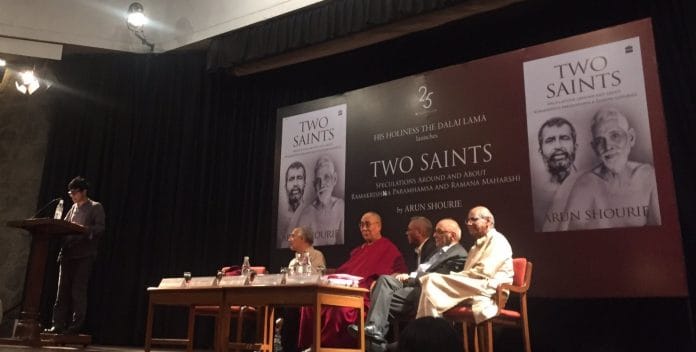Speakers at the launch of Arun Shourie’s new book said looking at our past and the lives of Indian mystics, whose lives were inextricably linked to religion yet so removed from the bigotry that vitiates religion today, can be extremely enlightening.
Lamenting that he seemed to know more about ancient Indian knowledge than his Indian friends, the Dalai Lama Thursday said that India has a thousand-year-old tradition of non-violence and Indians should pay attention to such traditions.
“Secularism means respecting all religions, and also respecting the non-believers,” the Tibetan spiritual leader said. India, he said, is the only country that can bring to the world a blend of ancient wisdom and scientific knowledge if the message of India reaches Tibet, it will become a more civilized and non-violent nation. “These days, I feel that as far as ancient Indian knowledge is concerned, I’m more Indian than my Indian friends. I appeal to Indians to pay attention to your own thousand-year-old traditions.”
The Dalai Lama was speaking at the launch of senior journalist and author Arun Shourie’s new book ‘Two Saints, Speculations around and about Ramakrishna Paramahamsa and Ramana Maharshi’, in the capital. He described the event – which also had renowned jurist Fali Nariman, former foreign secretary Shyam Saran and surgeon-writer Ambarish Satwik speaking – as a “reunion of old friends”.
Underlining the need to promote secular and tolerant voices in these “spiritually troubled times”, Nariman said that Shourie had carefully picked two austere lives to “express anguish” over the fact that the Hindu tradition of tolerance is not being followed by his countrymen today. The age-old Hindu tradition is showing strain, Nariman rued.
In the book, Shourie dissects the mystical experiences of the two saints and uses a combination of neuroscience, psychology and sociology to try and explain the esoteric question of mysticism. Shourie said he has, in the book, endeavoured to follow the Dalai Lama’s teachings on opening up faith to examination and added that intolerance was against Indian tradition.
Saran too stressed on the need to open up faith to questioning. The Buddha had himself told his preachers to not accept what he would say as the gospel truth, the former diplomat said, adding that this emerged emphatically from Shourie’s book.
Looking at our past and the lives of Indian mystics, whose lives were inextricably linked to religion yet so removed from the bigotry that vitiates religion today, can be extremely enlightening, was the message from the speakers. Ramana Maharshi, for example, neither criticised other religions nor others’ way of life, Nariman said. Paramahamsa declared his religion to be inferior to none but without ever denigrating Islam or Christianity in the process.
- Sanya Dhingra is a Reporter with ThePrint. You can follow her on Twitter @DhingraSanya






